A footballer with multiple Champions League winners medals recalls how he often encountered the same young boy waiting at the gates of a Premier League club’s training ground whenever he left.
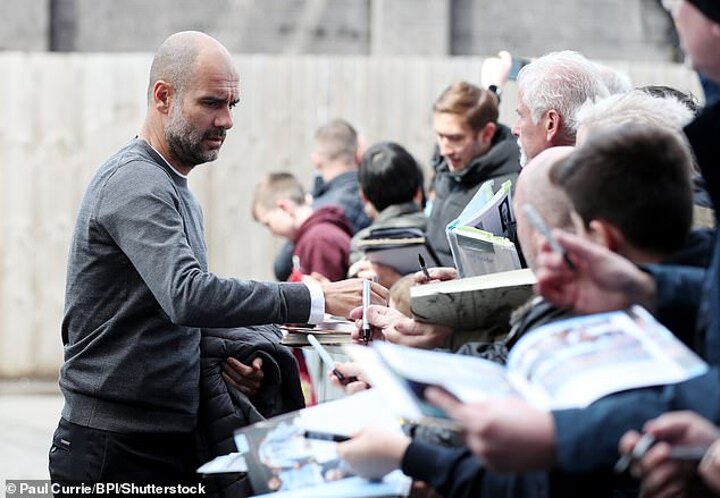
Out of habit and sympathy for the youngster who would be there come rain or shine, he would roll down his window and sign a number of items. It would take no more than 30 seconds.
A few weeks in, the player asked the boy why he wasn’t at school.
‘My dad pays me not to go to school,’ he said. ‘He drops me off to get everything signed, then picks me up. We make more from this than his normal job.’
Selling signed memorabilia is a lucrative business, with some football shirts going for four figures and now more than ever, independent sellers are popping up left, right and centre using social media to cash in.
Earlier this month, a video emerged of Pep Guardiola telling autograph hunters off near his home. ‘Do you want to live your life doing this, honestly?’ the Manchester City boss asks. ‘Don’t come again, I won’t tell you again. I know your faces.’
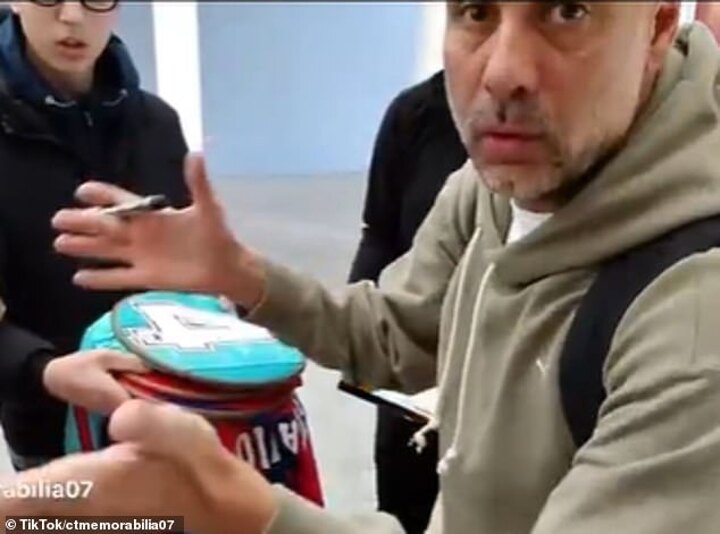
On the Stick to Football podcast, Roy Keane stuck the boot in by calling them ‘idiots’ and an ‘absolute nuisance’. ‘Good on you Pep,’ he added.
Within the industry, though, the perception is different, not least when so many signed goods don’t have a Certificate of Authenticity (CoA) or genuine proof that the item has actually been signed. ‘For those guys, that video is brilliant,’ says Ben Soley, director of sales at Icons.com. ‘It’s free promotion, free advertising and free authenticity.’
Icons.com began in 1999 and have a longstanding reputation when it comes to signed memorabilia. Their products come from closed signing sessions where players and managers are paid a fee for their time or for a set number of items, ranging from shirts to photos to armbands and boots. In terms of signed merchandise, they even have an exclusivity agreement with Lionel Messi.
‘Assuming they are selling, the value in total of those shirts in the video is easily four figures,’ says Soley. ‘The Barcelona home shirt, we sell that signed, framed and licensed by Barcelona for £650.
‘The numbers that go on the City shirt, there’s three of those that Pep signs. We sell that for £650 too but we pay for royalties and licenses. Buyers can re-sell later if they choose and the consumer gets something they can fully trust.’
Icons.com have working relationships with the likes of Eric Cantona, Ronaldo and Guardiola, who last had a signing session after City won the treble in 2023.
But without regulations, the internet is full of signed memorabilia from independent sellers, sold for a fraction of the price of those with CoAs, with many simply using photo or video proof. Peter Johnson, who founded Firma Stella, got his business off the ground by taking huge risks.
He told Mail Sport how he heard Barcelona were flying out of a public airport so flew there from Birmingham. He then booked a ‘fake flight’ from Barcelona to get into the terminal and got signed merchandise from the likes of Neymar, Luis Suarez and Messi.
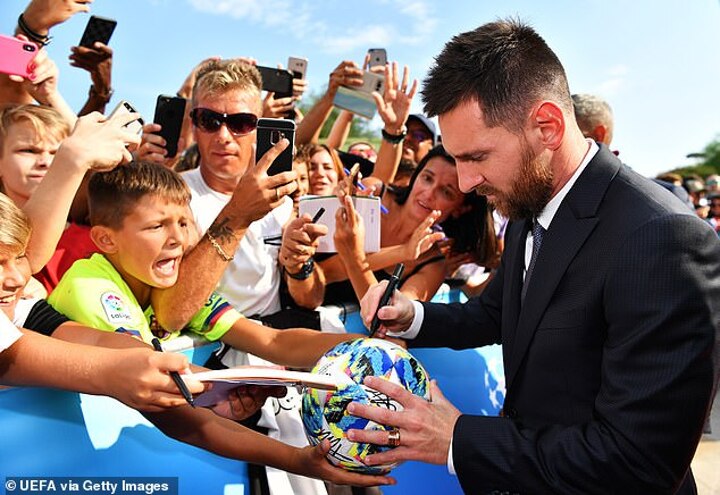
Now his company is one of the most recognised memorabilia brands in the world, working alongside stars such as Ben Stokes and Paul Gascoigne.
Increasingly, though, how autograph-hunters operate is a cause for concern. Some Premier League clubs fine players who stop outside training grounds. If one stops, it sets a precedent and hunters will return. It is also not uncommon for star players to report cars following them, and hunters will often book rooms in hotels where teams are staying.
Mail Sport recently revealed that Manchester United are increasingly frustrated with so-called ‘professionals’ who are haranguing their players with what sources call ‘industrial-scale autograph harvesting’ at Old Trafford. They arrive with armfuls of shirts or books full of numbers which can then be printed on to shirts, with many arriving five hours before kick-off to get their spot. Some turn up at Stockport station, which United often use to go to away games in London.
Outside Stamford Bridge, there are two sets of lights near Fulham Broadway station where hunters gather, knowing players will never make it through both lights on their way home and will have to stop at one. There are always genuine fans who turn up, but players are increasingly aware of the same faces and voices.
Some throw their kids in front as players are more likely to stop. There are no limits. Sir Alex Ferguson was furious when asked to sign a shirt outside Manchester Cathedral after the funeral of club icon Kath Phipps this month.
One hunter recalls how Cafu was on the phone in a hotel lobby and he put the shirt in front of his face. The two-time World Cup winner was furious but signed it to get him out of the way.
Examples like that are endless and explain why players stop even though they know they can be paid handsomely for signing items in a ‘legitimate’ manner. For top players, a one-hour independent signing sessions can earn them a five-figure sum.
‘It’s a human interaction and it doesn’t take much to sign a few things,’ says a former Premier League player. ‘We’ve got to get them out of the way, like when we’re leaving the ground. It’s frustrating but players are aware of their image and want to be seen to be interacting. With all the people around you it’s hard to pick between fans and sellers and you don’t want the backlash.’
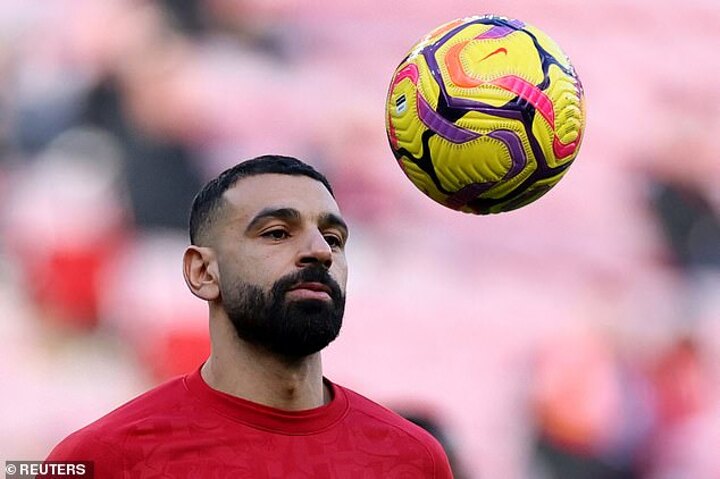
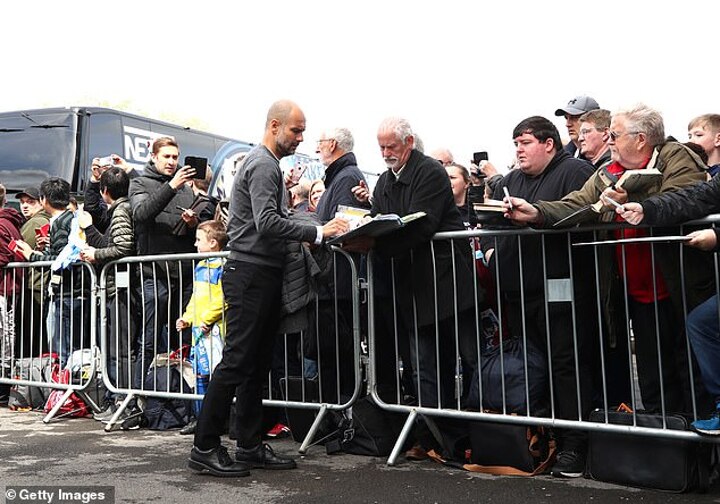
Some players such as Mohamed Salah don’t sign autographs at all, but blanket boycotts are rare and athletes are often content knowing these products end up being sold to genuine fans.
Customers are still exploited, though. When someone is selling 20 signed shirts at £100 a piece, for example, the understanding among those in the game is that they have secured one geniune signature then forged it across. Handwriting experts are used.
In 2008, the owner of a shop in Chester was found guilty of faking autographs after Liverpool and United players and rugby legend Jonny Wilkinson shared their concerns. Prosecutors found that bogus stock was mixed in with genuine stock, so it was easier to deceive the public.
More recently, Icons provided evidence in a court case where authorities raided a warehouse and caught a man signing away with a pen in hand. He made £1million over nine years and was found guilty of fraud and money laundering. ‘Ultimately it hurts everyone in the industry,’ says Soley. ‘There’s a huge black hole vacuum where nobody is checking and monitoring and buyers can’t trust.’
The market is only growing with people seeing signed memorabilia as investments. The market value of one authentic signed Messi shirt went from around £350 to £1500 after Argentina won the 2022 World Cup.
Increasingly, sellers pride themselves on the fact consumers don’t have to travel and wait outside stadiums and training grounds with no guarantee that they will get what they want.
‘It’s nice of Pep to say go to school and do something but everyone’s free to do what they want,’ says one autograph hunter, who only sells via Instagram and Facebook. ‘It’s not illegal, is it? There’s money to be made and we put in the time and effort.
‘You only have to look at the messages I got over Christmas to see we make dreams come true. We’re spending hours waiting in the cold so others don’t need to.’
